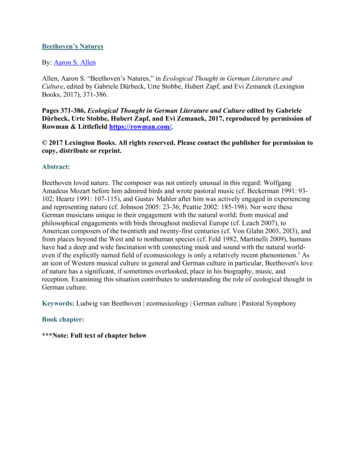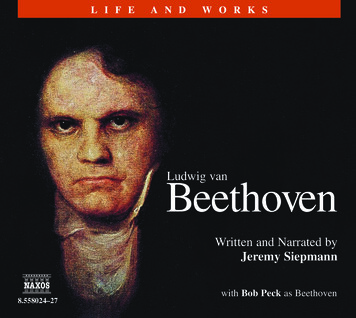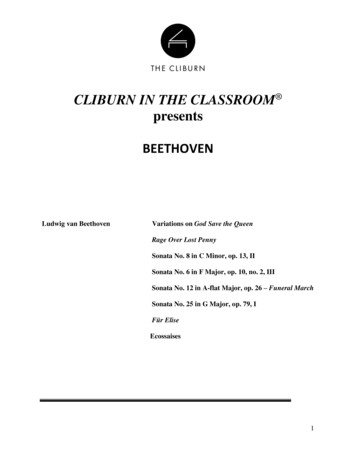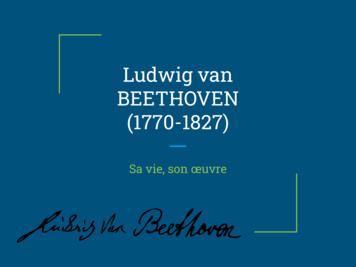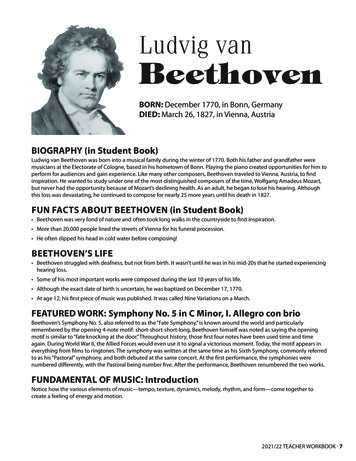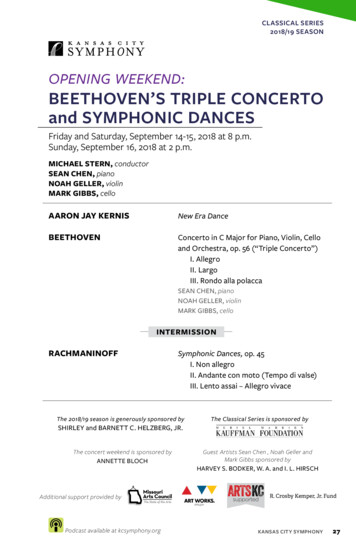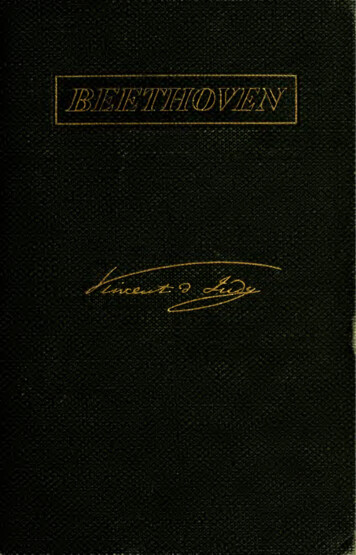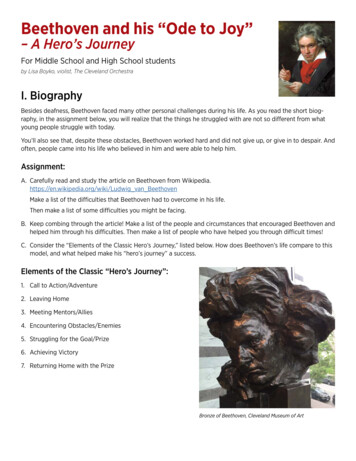
Transcription
Beethoven and his “Ode to Joy”– A Hero’s JourneyFor Middle School and High School studentsby Lisa Boyko, violist, The Cleveland OrchestraI. BiographyBesides deafness, Beethoven faced many other personal challenges during his life. As you read the short biography, in the assignment below, you will realize that the things he struggled with are not so different from whatyoung people struggle with today.You’ll also see that, despite these obstacles, Beethoven worked hard and did not give up, or give in to despair. Andoften, people came into his life who believed in him and were able to help him.Assignment:A. Carefully read and study the article on Beethoven from Wikipedia.https://en.wikipedia.org/wiki/Ludwig van BeethovenMake a list of the difficulties that Beethoven had to overcome in his life.Then make a list of some difficulties you might be facing.B. Keep combing through the article! Make a list of the people and circumstances that encouraged Beethoven andhelped him through his difficulties. Then make a list of people who have helped you through difficult times!C. Consider the “Elements of the Classic Hero’s Journey,” listed below. How does Beethoven’s life compare to thismodel, and what helped make his “hero’s journey” a success.Elements of the Classic “Hero’s Journey”:1. Call to Action/Adventure2. Leaving Home3. Meeting Mentors/Allies4. Encountering Obstacles/Enemies5. Struggling for the Goal/Prize6. Achieving Victory7. Returning Home with the PrizeBronze of Beethoven, Cleveland Museum of Art
Beethoven and his “Ode to Joy”– A Hero’s JourneyFor Middle School and High School studentsby Lisa Boyko, violist, The Cleveland OrchestraII. LiteratureBeethoven’s personal life story played out against the backdrop of a very turbulent time in history. Far fromstaying in his own musical “ivory tower,” Beethoven was very aware of the social and political currents of theday, and had strong opinions about them. His reading of the classics, as well as contemporary writers andphilosophers, informed his beliefs and provided inspiration for his music. That music was the language Beethovenused to challenge the prevailing stereotypes of the late 18th and early 19th centuries. Here are a few ways thatBeethoven challenged the status quo: Challenged social stereotypes by attempting to be self-employed; refusing to be treated as a servant or lowerclass citizen; insisting on writing music to please himself and not the elite of society. Challenged musical stereotypes by writing in a more heroic style, with in-your-face drama that can’t berelegated to “background dinner music”! Challenged political stereotypes by elevating democratic ideals and depicting freedom fighters in hisprogrammatic music. Challenged artistic stereotypes by proclaiming through his music a message to the world about human dignityand equality, human genius and freedom.Assignment:A. Read the following excerpts or summaries. How might these stories and ideas have influenced late 18th/early19th-century political, social and artistic trends in general?B. Listen to the accompanying musical examples. Can you hear echoes of these revolutionary ideas in Beethoven’smusic? Write about this!Roman mythology - eek-mythology/Sound Cloud prometheusproject/creatures-of-prometheus/Goethe - Egmont (attach PDF)More at: gutenberg.org/files/1945/1945-h/1945-h.htmSound Cloud link: sproject/egmont-overture/Kant - Groundwork of the Metaphysics of Moralsplato.stanford.edu/entries/kant-moral/Sound Cloud link: sproject/symphony-no-3/Schiller - Ode to history-724410Sound Cloud link: theusproject/symphony-9/
Beethoven and his “Ode to Joy”– A Hero’s JourneyFor Middle School and High School studentsby Lisa Boyko, violist, The Cleveland OrchestraIII. HistoryBeethoven walked the fine line between hiding from and engaging with the problems facing his generation.He knew he’d been given a unique and specific talent which he needed to use to respond to his times, andcommunicate with the society that he was a part of. Consider this timeline (far from exhaustive!) of events thathappened during Beethoven’s lifetime. Although he experienced the trauma of war (literally at his doorstep), healso witnessed the early stages of some amazing technological advances, as well as the beginnings of a broaderfranchise and greater justice for working people.Assignment:A. Draw a timeline and map out the events listed below.B. Choose an event or person from this outline and do more research. Write about what you learn.1770-1780 Beethoven born (1770) Industrial revolution begins in England with invention of steam engine (James Watt) and mechanical loom American colonies declare independence from England American Revolutionary War (1775-1783)1780-1790 Feudal system gradually dismantled in Western Europe Emperor in Austria, Joseph II, supports religious tolerance and free press U.S. Constitution crafted and ratified (1789); George Washington elected first president French Revolution begins (1789) Improvements and new uses for the steam engine First human flights in hot air balloons1790-1800 France embroils Europe in war “Reign of Terror” begins with execution of Louis XVI and Marie Antoinette Napoleon (b. 1769) rises to power, from soldier to commander-in-chief to First Consul Several European nations move to abolish slavery/slave trade Smallpox vaccine discovered and produced (Edward Jenner)
1800-1810 Napoleon proclaimed emperor France defeats Austria, occupies Vienna Napoleonic wars continue British army uses newly-invented rockets (William Congreve) in battle; shells invented (HenryShrapnel) Steam engine used to power boats (Robert Fulton) Electricity harnessed, batteries invented (Alessandro Volta)1810-1820 Austria makes new alliances, helps defeat Napoleon and occupy France America and Britain fight the War of 1812, considered “The Second War of Independence” Napoleon banished, returns and loses the Battle of Waterloo, banished again French monarchy restored Jews emancipated in Prussia Several German states receive constitutions Cities in Europe and America begin to install gas-lighting in their streets Homeopathic medicine founded (Samuel Hahnemann) First steamship crossing of the Atlantic1820-1830 South American colonies gain independencefrom Spain and Portugal Monroe Doctrine (U.S.) forbids more European colonization of the Americas Britain reforms penal system, allows workers to unionize First passenger railway systems established(Britain, France, U.S.) Erie Canal opens in U.S., facilitating travel and tradebetween Midwest and East Coast Early photographic inventions (Daguerre and Niepce) Napoleon dies (1821) Beethoven dies (1827)
Beethoven and his “Ode to Joy”– A Hero’s JourneyFor Middle School and High School studentsby Lisa Boyko, violist, The Cleveland OrchestraIV. Research and AnalysisRead through the following archival news reports from Cleveland and U.S. history. Do you think it was worth the effortand investment to found an orchestra and build a concert hall when terrible things were happening in the world? Is itworth it now, to create something beautiful and lasting, despite the stress and uncertainty we may be experiencing?Newspaper Clippings:1918 - The founding of The Cleveland Orchestra1918 - World War I and Flu Epidemic
Newspaper Clippings:1929 - Severance Hall ground-breaking1929 - Stock Market Crash
Beethoven and his “Ode to Joy”– A Hero’s JourneyFor Middle School and High School studentsby Lisa Boyko, violist, The Cleveland OrchestraV. SynthesisThink about the “history” that you have witnessed personally in your lifetime, or have heard accounts of from aparent or grandparent. Sometimes it seems overwhelming, doesn’t it? But each generation has its own storms toweather, its own obstacles to overcome, its own stereotypes to challenge.Looking back can help us to look forward!In each generation, lessons are learned, however imperfectly. Now we have the opportunity to build and improveon those lessons. Write your thoughts on this.What lessons are you learning in 2020?How is the COVID-19 pandemic similar to and different from the 1918 flu epidemic?How would you describe the political climate during this presidential election year?What lessons would you want to tell your own grandchildren about this time in history?To learn more about Beethoven, andmeet the author of this Beethovencurriculum, Cleveland Orchestra violistLisa Boyko, click on the link below:https://youtu.be/UAPGkE7Yy8EBeethoven Monument, Vienna, Austria
Beethoven and his “Ode to Joy” – A Hero’s Journey II. Literature Beethoven’s personal life story played out against the backdrop of a very turbulent time in history. Far from staying in his own musical “ivory tower,” Beethoven was very aware of the social and political

